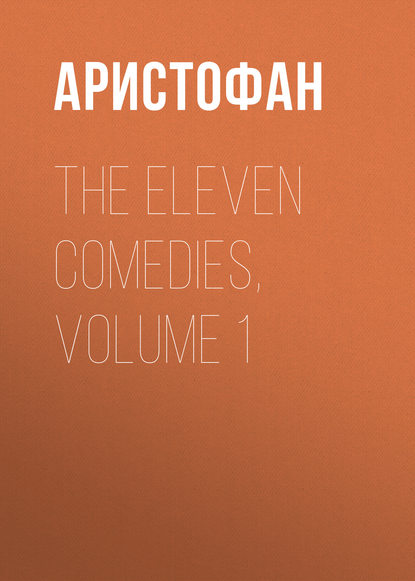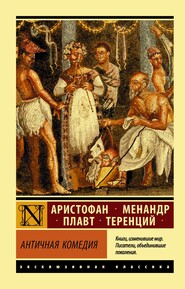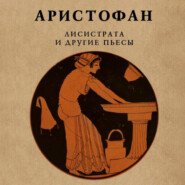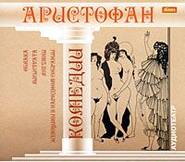По всем вопросам обращайтесь на: info@litportal.ru
(©) 2003-2024.
✖
The Eleven Comedies, Volume 1
Автор
Год написания книги
2018
Настройки чтения
Размер шрифта
Высота строк
Поля
HERALD. The King's Eye!
DICAEOPOLIS. Eh! Great gods! Friend, with thy great eye, round like the hole through which the oarsman passes his sweep, you have the air of a galley doubling a cape to gain the port.
AMBASSADOR. Come, Pseudartabas, give forth the message for the Athenians with which you were charged by the Great King.
PSEUDARTABAS. Jartaman exarx 'anapissonnai satra.[168 - Jargon, no doubt meaningless in all languages.]
AMBASSADOR. Do you understand what he says?
DICAEOPOLIS. By Apollo, not I!
AMBASSADOR. He says, that the Great King will send you gold. Come, utter the word 'gold' louder and more distinctly.
DICAEOPOLIS. Thou shalt not have gold, thou gaping-arsed Ionian.[169 - The Persians styled all Greeks 'Ionians' without distinction; here the Athenians are intended.]
DICAEOPOLIS. Ah! may the gods forgive me, but that is clear enough.
AMBASSADOR. What does he say?
DICAEOPOLIS. That the Ionians are debauchees and idiots, if they expect to receive gold from the barbarians.
AMBASSADOR. Not so, he speaks of medimni[170 - A Greek measure, containing about six modii.] of gold.
DICAEOPOLIS. What medimni? Thou art but a great braggart; but get your way, I will find out the truth by myself. Come now, answer me clearly, if you do not wish me to dye your skin red. Will the Great King send us gold? (Pseudartabas makes a negative sign.) Then our ambassadors are seeking to deceive us? (Pseudartabas signs affirmatively.) These fellows make signs like any Greek; I am sure that they are nothing but Athenians. Oh, ho! I recognize one of these eunuchs; it is Clisthenes, the son of Sibyrtius.[171 - Noted for his extreme ugliness and his obscenity. Aristophanes frequently holds him to scorn in his comedies.] Behold the effrontery of this shaven rump! How! great baboon, with such a beard do you seek to play the eunuch to us? And this other one? Is it not Straton?
HERALD. Silence! Let all be seated. The Senate invites the King's Eye to the Prytaneum.[172 - Ambassadors were entertained there at the public expense.]
DICAEOPOLIS. Is this not sufficient to drive one to hang oneself? Here I stand chilled to the bone, whilst the doors of the Prytaneum fly wide open to lodge such rascals. But I will do something great and bold. Where is Amphitheus? Come and speak with me.
AMPHITHEUS. Here I am.
DICAEOPOLIS. Take these eight drachmae and go and conclude a truce with the Lacedaemonians for me, my wife and my children; I leave you free, my dear citizens, to send out embassies and to stand gaping in the air.
HERALD. Bring in Theorus, who has returned from the Court of Sitalces.[173 - King of Thrace.]
THEORUS. I am here.
DICAEOPOLIS. Another humbug!
THEORUS. We should not have remained long in Thrace….
DICAEOPOLIS. Forsooth, no, if you had not been well paid.
THEORUS. … If the country had not been covered with snow; the rivers were ice-bound at the time that Theognis[174 - The tragic poet.] brought out his tragedy here; during the whole of that time I was holding my own with Sitalces, cup in hand; and, in truth, he adored you to such a degree, that he wrote on the walls, "How beautiful are the Athenians!" His son, to whom we gave the freedom of the city, burned with desire to come here and eat chitterlings at the feast of the Apaturia;[175 - A feast lasting three days and celebrated during the month Pyanepsion (November). The Greek word contains the suggestion of fraud ([Greek: apat_e]).] he prayed his father to come to the aid of his new country and Sitalces swore on his goblet that he would succour us with such a host that the Athenians would exclaim, "What a cloud of grasshoppers!"
DICAEOPOLIS. May I die if I believe a word of what you tell us! Excepting the grasshoppers, there is not a grain of truth in it all!
THEORUS. And he has sent you the most warlike soldiers of all Thrace.
DICAEOPOLIS. Now we shall begin to see clearly.
HERALD. Come hither, Thracians, whom Theorus brought.
DICAEOPOLIS. What plague have we here?
THEORUS. 'Tis the host of the Odomanti.[176 - A Thracian tribe from the right bank of the Strymon.]
DICAEOPOLIS. Of the Odomanti? Tell me what it means. Who has mutilated their tools like this?
THEORUS. If they are given a wage of two drachmae, they will put all Boeotia[177 - The Boeotians were the allies of Sparta.] to fire and sword.
DICAEOPOLIS. Two drachmae to those circumcised hounds! Groan aloud, ye people of rowers, bulwark of Athens! Ah! great gods! I am undone; these Odomanti are robbing me of my garlic![178 - Dicaeopolis had brought a clove of garlic with him to eat during the Assembly.] Will you give me back my garlic?
THEORUS. Oh! wretched man! do not go near them; they have eaten garlic.[179 - Garlic was given to game-cocks, before setting them at each other, to give them pluck for the fight.]
DICAEOPOLIS. Prytanes, will you let me be treated in this manner, in my own country and by barbarians? But I oppose the discussion of paying a wage to the Thracians; I announce an omen; I have just felt a drop of rain.[180 - At the least unfavourable omen, the sitting of the Assembly was declared at an end.]
HERALD. Let the Thracians withdraw and return the day after to-morrow; the Prytanes declare the sitting at an end.
DICAEOPOLIS. Ye gods, what garlic I have lost! But here comes Amphitheus returned from Lacedaemon. Welcome, Amphitheus.
AMPHITHEUS. No, there is no welcome for me and I fly as fast as I can, for I am pursued by the Acharnians.
DICAEOPOLIS. Why, what has happened?
AMPHITHEUS. I was hurrying to bring your treaty of truce, but some old dotards from Acharnae[181 - The deme of Acharnae was largely inhabited by charcoal-burners, who supplied the city with fuel.] got scent of the thing; they are veterans of Marathon, tough as oak or maple, of which they are made for sure—rough and ruthless. They all set to a-crying, "Wretch! you are the bearer of a treaty, and the enemy has only just cut our vines!" Meanwhile they were gathering stones in their cloaks, so I fled and they ran after me shouting.
DICAEOPOLIS. Let 'em shout as much as they please! But have you brought me a treaty?
AMPHITHEUS. Most certainly, here are three samples to select from,[182 - He presents them in the form of wines contained in three separate skins.] this one is five years old; take it and taste.
DICAEOPOLIS. Faugh!
AMPHITHEUS. Well?
DICAEOPOLIS. It does not please me; it smells of pitch and of the ships they are fitting out.[183 - Meaning, preparations for war.]
AMPHITHEUS. Here is another, ten years old; taste it.
DICAEOPOLIS. It smells strongly of the delegates, who go round the towns to chide the allies for their slowness.[184 - Meaning, securing allies for the continuance of the war.]
AMPHITHEUS. This last is a truce of thirty years, both on sea and land.
DICAEOPOLIS. Oh! by Bacchus! what a bouquet! It has the aroma of nectar and ambrosia; this does not say to us, "Provision yourselves for three days." But it lisps the gentle numbers, "Go whither you will."[185 - When Athens sent forth an army, the soldiers were usually ordered to assemble at some particular spot with provisions for three days.] I accept it, ratify it, drink it at one draught and consign the Acharnians to limbo. Freed from the war and its ills, I shall keep the Dionysia[186 - These feasts were also called the Anthesteria or Lenaea; the Lenaeum was a temple to Bacchus, erected outside the city. They took place during the month Anthesterion (February).] in the country.
AMPHITHEUS. And I shall run away, for I'm mortally afraid of the Acharnians.
CHORUS. This way all! Let us follow our man; we will demand him of everyone we meet; the public weal makes his seizure imperative. Ho, there! tell me which way the bearer of the truce has gone; he has escaped us, he has disappeared. Curse old age! When I was young, in the days when I followed Phayllus,[187 - A celebrated athlete from Croton and a victor at Olympia; he was equally good as a runner and at the 'five exercises' ([Greek: pentathlon.]).] running with a sack of coals on my back, this wretch would not have eluded my pursuit, let him be as swift as he will; but now my limbs are stiff; old Lacratides[188 - He had been Archon at the time of the battle of Marathon.] feels his legs are weighty and the traitor escapes me. No, no, let us follow him; old Acharnians like ourselves shall not be set at naught by a scoundrel, who has dared, great gods! to conclude a truce, when I wanted the war continued with double fury in order to avenge my ruined lands. No mercy for our foes until I have pierced their hearts like a sharp reed, so that they dare never again ravage my vineyards. Come, let us seek the rascal; let us look everywhere, carrying our stones in our hands; let us hunt him from place to place until we trap him; I could never, never tire of the delight of stoning him.











